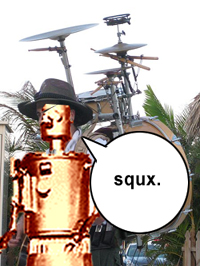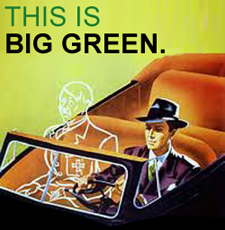Bam boom.
What are you going to do, play on garbage cans? That works for some songs, but how long can it possibly hold up? We need a more permanent solution to our problem. (Did I say that?)
 Okay, so ... this will come as no surprise to any long time followers of Big Green, but we make recordings using technology roughly equivalent to stone knives and bear skins, as the late Leonard Nimoy once put it. (My guess is that he had 1000 times the resources when he cut "Mr. Spock's Songs from Outer Space," but I digress.) We are plagued by technical glitches and the spotty performance of superannuated recording equipment, including a first generation digital workstation with no practical means of exporting song data or sound files (namely a Roland VS-2480 from the year 2001). It is choked with projects and ready to keel over.
Okay, so ... this will come as no surprise to any long time followers of Big Green, but we make recordings using technology roughly equivalent to stone knives and bear skins, as the late Leonard Nimoy once put it. (My guess is that he had 1000 times the resources when he cut "Mr. Spock's Songs from Outer Space," but I digress.) We are plagued by technical glitches and the spotty performance of superannuated recording equipment, including a first generation digital workstation with no practical means of exporting song data or sound files (namely a Roland VS-2480 from the year 2001). It is choked with projects and ready to keel over.
Now, don't get me wrong ... we have invested in newer technology. Mitch picked up a new blender last week. Great for daiquiris (I hate daiquiris!) and it makes a nice whine on high. Marvin (my personal robot assistant) installed a new oscillator the other day. THAT cost a packet. Seems like when it comes around to music gear, the well runs dry. Not freaking fair, I say. But then, I'm liable to say anything by this point in the day, or perhaps just build sentences using words that Android suggests (Android:) the same time as the most important ...
 Yeah, see? This machine doesn't know how to make sense. Give me a rudimentary non-verbal robot assistant any day. Still, with our grueling production schedule - 20 songs a year, sometimes 50, sometimes umpteen thousand - we need to come up with a way of plugging these suckers together, like widgets on an assembly line. I'm sure this is the type of problem all songwriting teams have encountered since the beginning of recorded music. The difference between them and us is, well, we're not paid. But it's the mission that matters! Huzzah!
Yeah, see? This machine doesn't know how to make sense. Give me a rudimentary non-verbal robot assistant any day. Still, with our grueling production schedule - 20 songs a year, sometimes 50, sometimes umpteen thousand - we need to come up with a way of plugging these suckers together, like widgets on an assembly line. I'm sure this is the type of problem all songwriting teams have encountered since the beginning of recorded music. The difference between them and us is, well, we're not paid. But it's the mission that matters! Huzzah!
What is our mission again? Oh, right. Finish the songs.
 Okay, so ... this will come as no surprise to any long time followers of Big Green, but we make recordings using technology roughly equivalent to stone knives and bear skins, as the late Leonard Nimoy once put it. (My guess is that he had 1000 times the resources when he cut "Mr. Spock's Songs from Outer Space," but I digress.) We are plagued by technical glitches and the spotty performance of superannuated recording equipment, including a first generation digital workstation with no practical means of exporting song data or sound files (namely a Roland VS-2480 from the year 2001). It is choked with projects and ready to keel over.
Okay, so ... this will come as no surprise to any long time followers of Big Green, but we make recordings using technology roughly equivalent to stone knives and bear skins, as the late Leonard Nimoy once put it. (My guess is that he had 1000 times the resources when he cut "Mr. Spock's Songs from Outer Space," but I digress.) We are plagued by technical glitches and the spotty performance of superannuated recording equipment, including a first generation digital workstation with no practical means of exporting song data or sound files (namely a Roland VS-2480 from the year 2001). It is choked with projects and ready to keel over.
Now, don't get me wrong ... we have invested in newer technology. Mitch picked up a new blender last week. Great for daiquiris (I hate daiquiris!) and it makes a nice whine on high. Marvin (my personal robot assistant) installed a new oscillator the other day. THAT cost a packet. Seems like when it comes around to music gear, the well runs dry. Not freaking fair, I say. But then, I'm liable to say anything by this point in the day, or perhaps just build sentences using words that Android suggests (Android:) the same time as the most important ...
 Yeah, see? This machine doesn't know how to make sense. Give me a rudimentary non-verbal robot assistant any day. Still, with our grueling production schedule - 20 songs a year, sometimes 50, sometimes umpteen thousand - we need to come up with a way of plugging these suckers together, like widgets on an assembly line. I'm sure this is the type of problem all songwriting teams have encountered since the beginning of recorded music. The difference between them and us is, well, we're not paid. But it's the mission that matters! Huzzah!
Yeah, see? This machine doesn't know how to make sense. Give me a rudimentary non-verbal robot assistant any day. Still, with our grueling production schedule - 20 songs a year, sometimes 50, sometimes umpteen thousand - we need to come up with a way of plugging these suckers together, like widgets on an assembly line. I'm sure this is the type of problem all songwriting teams have encountered since the beginning of recorded music. The difference between them and us is, well, we're not paid. But it's the mission that matters! Huzzah!
What is our mission again? Oh, right. Finish the songs.
Comments